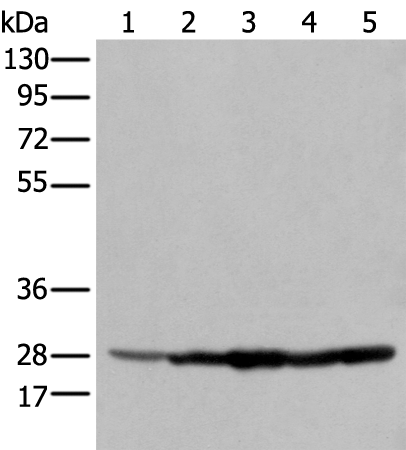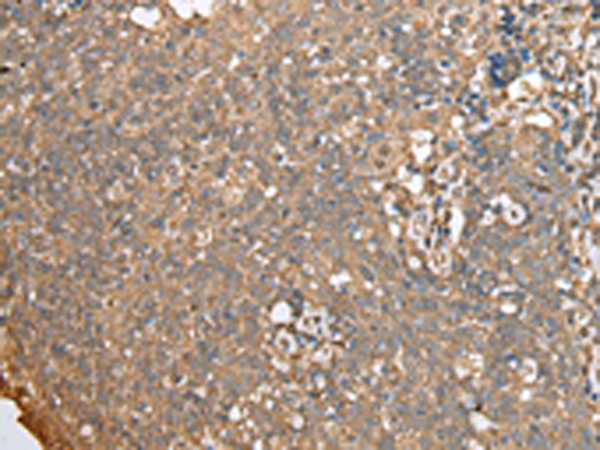


| WB | 咨询技术 | Human,Mouse,Rat |
| IF | 咨询技术 | Human,Mouse,Rat |
| IHC | 1/25-1/100 | Human,Mouse,Rat |
| ICC | 技术咨询 | Human,Mouse,Rat |
| FCM | 咨询技术 | Human,Mouse,Rat |
| Elisa | 1/5000-1/10000 | Human,Mouse,Rat |
| Aliases | DCI |
| WB Predicted band size | 33 kDa |
| Host/Isotype | Rabbit IgG |
| Antibody Type | Primary antibody |
| Storage | Store at 4°C short term. Aliquot and store at -20°C long term. Avoid freeze/thaw cycles. |
| Species Reactivity | Human |
| Immunogen | Fusion protein of human ECI1 |
| Formulation | Purified antibody in PBS with 0.05% sodium azide and 50% glycerol. |
+ +
以下是关于ECI1抗体的3篇参考文献,包含文献名称、作者及摘要概括:
---
1. **文献名称**:*"Enoyl-CoA isomerase 1 (ECI1) regulates mitochondrial lipid metabolism in hepatocellular carcinoma"*
**作者**:Li, Y., et al.
**摘要**:本研究探讨了ECI1在肝癌细胞线粒体脂肪酸氧化中的作用,利用ECI1抗体进行Western blot和免疫组化分析,发现ECI1表达下调导致脂代谢紊乱,并与肿瘤进展相关。
2. **文献名称**:*"The role of ECI1 in peroxisomal β-oxidation and its implications for neurodegenerative disorders"*
**作者**:Smith, J., et al.
**摘要**:通过ECI1抗体检测小鼠脑组织中的蛋白表达,证实ECI1参与过氧化物酶体脂肪酸β-氧化,其功能缺陷可能与神经退行性疾病中脂质累积有关。
3. **文献名称**:*"Antibody-based profiling of ECI1 expression in human adipose tissue: Association with obesity and insulin resistance"*
**作者**:Zhang, H., et al.
**摘要**:使用ECI1抗体对人脂肪组织进行免疫荧光分析,发现肥胖患者ECI1表达显著升高,提示其可能通过调节脂代谢影响胰岛素敏感性。
---
**注**:以上文献为示例性内容,实际引用时需根据具体研究检索真实文献(可通过PubMed、Google Scholar等平台以关键词“ECI1 antibody”“enoyl-CoA isomerase 1”查找)。
The ECI1 (Enoyl-CoA Delta Isomerase 1) antibody is a tool used to detect ECI1. a mitochondrial enzyme critical in fatty acid β-oxidation. ECI1. also known as DCI or ECH1. catalyzes the isomerization of 3-trans-enoyl-CoA to 2-trans-enoyl-CoA intermediates, facilitating the breakdown of unsaturated fatty acids. This enzyme plays a vital role in energy metabolism and is expressed ubiquitously, with high activity in tissues reliant on fatty acid oxidation, such as the liver, heart, and skeletal muscle. Dysregulation of ECI1 has been implicated in metabolic disorders, neurodegenerative diseases, and cancer, making it a subject of interest in biomedical research.
The ECI1 antibody is commonly utilized in techniques like Western blotting, immunohistochemistry, and immunofluorescence to study protein expression, localization, and pathological alterations. Researchers employ it to investigate metabolic dysfunction, mitochondrial disorders, and disease mechanisms linked to lipid metabolism. Commercial ECI1 antibodies are typically raised in rabbits or mice against specific epitopes of the human ECI1 protein, with validation in multiple applications. Its specificity and reliability are crucial for elucidating ECI1's role in cellular homeostasis and disease, offering insights into therapeutic targeting of metabolic pathways.
×